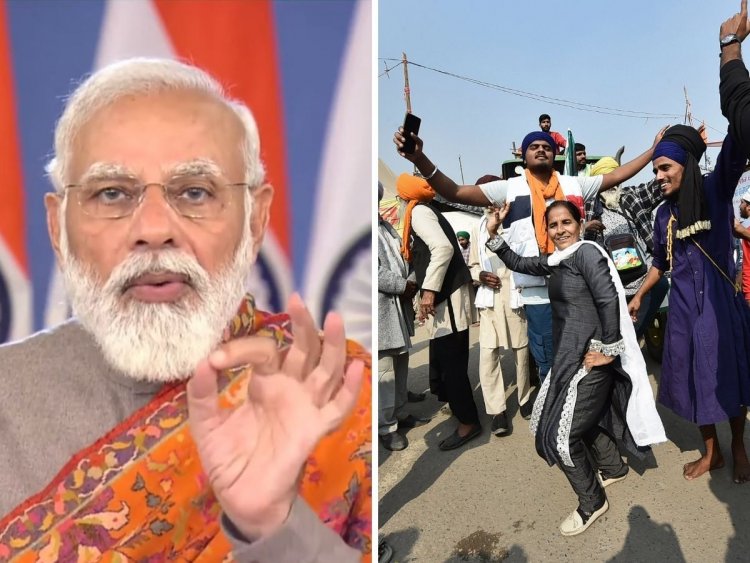Repeal of Farm Laws: PM Modi’s Deliberate Change in Strategy
Asia News Agency

After intense negotiations, the farmers protesting at the borders of the national capital Thursday finally ended their year-long movement. This comes in the wake of the Centre accepting all demands put forward by the protesting farmers, including the withdrawal of all agitation-related cases and compensation to the families of farmers who had died during the course of the movement against the contentious agriculture laws.
Farmer demands
The following were the demands of the protesting farmers:
1. Withdrawal of all the agitation-related cases registered during this protest in all states and Union territories, or under central government agencies, etc.
2. Compensation to all the families of the agitating farmers who died during the course of agitation.
3. No criminal liability to farmers in the cases of stubble burning.
4. The government has to discuss the Electricity Amendment Bill with the SKM or with other farmers' unions before bringing it up in Parliament.
5. A committee to discuss minimum support price (MSP) is to be formed; the SKM will list out their members in the panel and provide it to the farmers.
6. The ongoing policy on MSP and its procurement in the country will continue as it is.
Prime Minister Narendra Modi had announced on November 19 that the central government will bring necessary bills in the winter session of Parliament to repeal the farm laws. He had also assured that the government will be constituting a committee to work on a new framework for MSP.
Both the Lok Sabha and the Rajya Sabha passed the Farm Laws Repeal Bill on the first day of the winter session on November 29. President Ram Nath Kovind gave his assent to the bill, which completed the process of repealing the three farm laws.
Reforms necessary, but before that, trust needs to be restored
Even as there is much relief one both sides, structural problems in agriculture need to be addressed. “Reforms are necessary for farm incomes to rise, productivity to increase, for better storage and distribution of produce, expansion of the market, and to deal with matters such as declining soil fertility and water tables,” writes The Indian Express. But first, trust between the farming community and the government, is to be restored. “The government, hopefully, will learn from the perseverance of the protesters that it needs to address their insecurity in a regime where actual price realisation is not easy and harvests are increasingly hostage to weather events. The dependence on MSP and state-led procurement is the consequence of imperfect and underdeveloped markets that impose costs on farmers.”
PM Modi’s unexpected retreat to ‘cut his reputational losses’
Debate continues on Prime Minister (PM) Narendra Modi’s unexpected retreat on agriculture reform. This, writes Rajdeep Sardesai (senior journalist and author) is a “deliberate change in strategy…..
"The most plausible explanation lies in the fact that, as an astute politician, Modi recognised that the protests could prove electorally detrimental ahead of a string of assembly elections, especially in the politically critical state of Uttar Pradesh (UP)……”
But, “they don’t quite reflect the manner in which the PM appears to have personally acknowledged his failure in not being able to push through the farm laws. After all, Modi could easily have got any of his Cabinet colleagues to step up and take the blame for misreading the mood of the agitating farmers…….It is almost as if the seemingly indestructible ‘Big Boss’ is trying to rebrand himself as an occasionally fallible leader, if only to remove the sting from his opponents’ prime criticism of being an arrogant autocrat…..”
Tactical move: This time, says Sardesai “the apology can be seen as a tactical move linked to refurbishing the PM’s self-image as a protector of the 'garib kisan’ (poor farmer). Go through any major Modi speech on the campaign trail and he almost always refers to his commitment to the ‘garib kisan’. Modi could afford to antagonise India’s wealthy with his demonetisation gambit; he could even anger the middle-class by allowing fuel prices to climb. A large section of India’s rich and neo-middle class can, after all, be lured by a promised Hindutva haven that taps into sharp religious emotions……
"But for the wider national constituency of the poor and farmers, the PM needs to be seen as a caring and benevolent patriarch above all else.”
Paying a price for not taking the farm agitation seriously: In a sense thus, “the government, secure in its massive parliamentary majority, has paid a price for not taking the farm agitation seriously enough for way too long. In the end, all the PM could do is cut his reputational losses. The repeal of the laws, therefore, isn’t about addressing the farmers’ anxieties, but rather because, in politics, there is always one inner voice that no leader can ignore: The sound of the election bugle.”
















